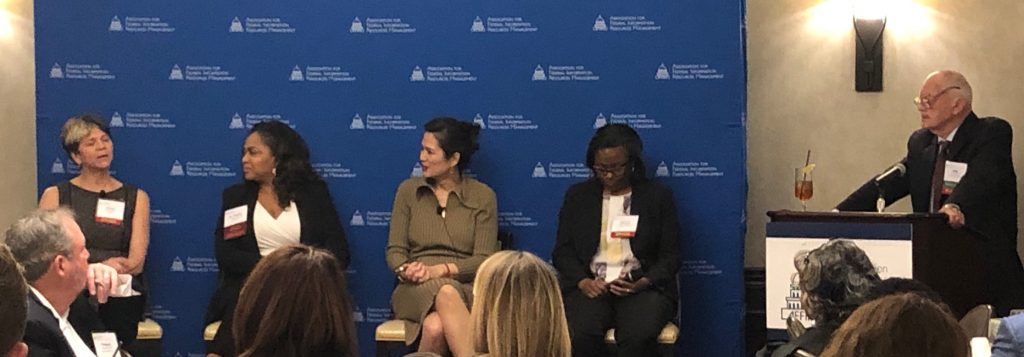We’ve all looked at people who embody our definition of success and wondered, “How did they get there?” At a lunch on Feb. 28, I was able to listen to women in government who have answered that question.
The Association for Federal Information Resources Management (AFFIRM) hosted their “Trailblazing Women in Government IT” event with the following speakers:
- Renee P. Wynn, Chief Information Officer at NASA
- Terryne F. Murphy, Deputy CIO, Commerce Department (DOC)
- Pamela McCauley, Program Director, Computer Information Science and Engineering (CISE) Directorate, Division of Computer and Division of Computer and Network Systems (CNS), National Science Foundation (NSF)
- Melinda Rogers, Deputy Chief Information Officer at the Department of Justice
Mike Causey, Senior Correspondent, News Team at Federal News Network moderated the event, and first asked how each woman got to where they are today.
Murphy characterized her journey as an interesting one. She was an ROTC recipient and joined the Army right out of college as a telecommunications officer. Her college background in engineering opened a door when she transitioned into the private sector: she was a systems engineer for seven years for GTE Government Systems. She came back to the public sector in 2005 by assuming the role of Deputy CIO at Executive Office for Immigration Review within the Justice Department.
“It was a lot of hard work,” Murphy admitted, “but doors open when you’re prepared.”
Murphy described herself as an “army brat.” Her father was actually the one who commissioned her. When he commissioned her, right after he gave her the oath, he hugged her and said, “Blossom where you’re planted, and your career will take care of itself.” Murphy found that to be true in the Army, but in need of some revision when applied to the private and public sectors.
“Fundamentally my dad was right,” she said, “and I wish he could be here to see me now.”
Melinda Rogers, today Deputy Chief Information Officer at the Department of Justice, started her career in the private sector, holding different positions at Procter & Gamble and NationsBank, and serving as Assistant Vice President for Equifax’s Fraud Prevention and Identity Verifications Solutions. She took three years off to be a stay-at-home mom and described that period as a hard one. “I have a lot of respect for women who are stay-at-home moms,” she said. “I probably wasn’t good enough to do that.”
Eventually, Rogers dusted off her work clothes and started looking for positions. She had been out of the workforce for a few years, and spoke about how she her ego aside, and worked to start from the bottom. At one point, she was rejected from an administrative assistant position.
“Sometimes rejection leads to other opportunities that open up for you,” Rogers explained. “I feel very lucky that I was rejected, because look at where I am – I was able to share that story with you today.”
Rogers joined DOJ in 2010 with very little knowledge of how the department worked. It was through networking and learning as much as possible that she was able to reach the position she now holds: Deputy CIO of DOJ.
“My personal takeaway was work hard,” Rogers stated. “I would stay focused on results. Activity does not equal productivity. You can work really hard, but are you working smart? Ultimately, how does what you’re doing make your organization better?”
Finding passion for what you do is also key according to Rogers, even if the topics you work with aren’t initially in your area of expertise.
McCauley’s path was a little different: her background is in industrial engineering and she has been a professor for 26 years. “I love solving problems, that’s what makes me happy,” McCauley said. “But we don’t solve problems fast enough.”
She finds it rewarding to see the effects of her scientific work, specifically in the impact it has on the world, and emphasized the importance of mentors of all different backgrounds in her professional development. In terms of McCauley’s top habits for success, she stated: “Pray. I pray. Every morning I start off my day with a devotional. And then in the evening I have wine.”
Wynn has been with NASA for over three years, after spending 25 years with the Environmental Protection Agency (EPA). While NASA wasn’t where she initially imagined herself, she has learned on the job and brought her experience with environmental policy, budget formulation, program management, and analysis to her position as CIO.
She developed the skills to manage the IT part of her job along the trajectory of her career; she actually holds a Bachelor of Arts in Economics from DePauw University, Indiana.
“I’m not in IT; I’m in the people business,” Wynn said.
What’s the most interesting or inspiring “how did you get there?” response you’ve ever heard? Let us know in the comments below.
